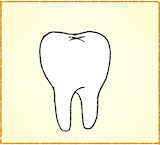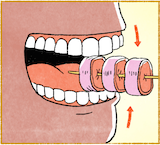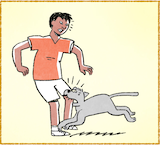


อันนี้เป็นอี่หยัง อันนี้เป็นแข้ว เขาเอิ้นว่าแข้ว
แข้วของคนนี้หละ เบิ่งซงแล้วอันบักใหญ่หนึ่ง
แข้วคนนี้มีไว้เฮ็ดหญัง มีปะโยดอี่หยัง กะเอาไว้ถ้ากัดนั้นกัดนี้ กินนั้นกินนี้
แข้วนี้มันอยู่ในปากเด๊ มันอยู่ในปาก เป็นอะวัยยะวะอันหนึ่งของคน
แล้วสัดอื่นๆ กะมีแข้วคือกัน ซู่โตกะสิมีแข้วเนาะ กะสิซ้าง ม้า งัว ควย มีเบิดซู่โต ซู่สิ่งซู่อย่างสิมีแข้วเบิดซู่โต แต่ว่าบางสัดกะสิบ่มีแข้วเนาะ กะสิมีปากซื่อๆ บ่มีแข้ว
16
เขากำลังกัดกินอี่หยังอย่างหนึ่งนี้หละ เบิ่งไปคักๆ หนิ คือสิเป็นลูกซิ้นเนาะ หลือว่าเป็นซิ้นเนี้ยเนาะ เป็นย้างเนี้ย เป็นคำๆ อยู่ เขากำลังสิกัดกิน
เบิ่งซงแล้ว อาดสิมีสี่ต่น กินไปแล้วต่นหนึ่ง กำลังสิกินอีกต่นหนึ่ง ตอนนี้มันเหลียสามต่น กินเข้าไปในปากแล้วต่นหนึ่ง เหลียสามต่น
ตอนนี้กำลังสิกัดอีกต่นหนึ่งเนาะ เขาใซ้แข้วของเขาหละ ข้างหลังข้างเทิงกัด ม่ำเข้าไป กำลังสิกัดเข้าไป คือสิแซบคักแซบนัวเนาะ
17
เกิดอี่หยังขึ้น กะมีหมาโตหนึ่งนั้นหละ แล่นไปงับขาเขา เหลียวเบิ่งดูพุ้นหนะ แล่นไปงับขา ไปกัดขาพุซายพุหนึ่ง
คือสิเจ็บคักเจ็บแน่เนาะ เจ้าว่าเป็นตาเจ็บบ่ กะสิเจ็บอยู่แล้ว กะสิเจ็บคักอยู่แล้วเนาะ เบิ่งซงแล้ว หมา แข้วหมามันกะแหลม มันกะคมคักเนาะ กัดเข้าไปกะเจ็บคักเติบพุ้นแหล้ว
ขั้นหมากัดหนิมันอันตะลายบ่ กะอันตะลายเติบพุ้นแหล้ว กะต้องไปหาหมอ ไปให้หมอสีดยาพุ้นแหล้ว ขั้นบ่ไปกะ อาดสิเป็นหมาบ้า หลือว่าเป็นหมาว้อกะได้ เพาะว่าพิดสุนักบ้ามันมีอยู่ในหมาทุกโต ขั้นบ่ไปลักสาหลือว่าไปสีดยากับหมอ ไปเอายากับหมอ กะอาดสิเกิดอันตะลายได้
Link to overview page
Link to dictionary
| Isaan | Pronunciation | Tones | Thai | English/Notes |
|---|---|---|---|---|
| อัน | an | M | อัน | 1. thing, object 2. general clf. for objects |
| นี้ | ni: | HF | นี้ | 1. this 2. here |
| เป็น | pen | M | เป็น | 1. to be, to exist 2. to be able to 3. to suffer, sth. happens to 4. เป็นหญัง[...]คือ in initial position: why? {เป็นหญังเขากะคือแปงฟัน = Why is he brushing his teeth?} {เป็นหญังเคี่ยงบินมันคือสิตก = Why is the airplane falling down?} |
| อี่หยัง | i:-yaŋ | H-M | อะไร | 1. what {นี้คืออี่หยัง = What is this?} {มื้อนี้เจ้าเฮ็ดอี่หยัง = What are you doing today?} {กินเข้างายกับอี่หยัง = What did you have for breakfast?} 2. something, anything, (in negations) nothing {บ่ต้องเฮ็ดอี่หยังอีกเลยนอกจากใส่ปุย = [we] don't need to do anything besides adding fertilizer} |
| แข้ว | khɛ:o | LF | ฟัน | tooth {หมามันมีแข้ว = the dog has teeth} |
| เขา | khao | M | เขา | personal pronoun: he, she |
| เอิ้น | ə:n | HF | พูด, เรียก | to call, to say {เอิ้นง่ายๆ ว่า = in other words} {คนอี่สานเอิ้นว่า เป็นลูกคนกก = Isaan people call her ลูกคนกก} |
| ว่า | wa: | H | ว่า | 1. that, as {คำว่า X = the word X} 2. to say |
| ของ | khɔ:ŋ | M | ของ | of, belonging to |
| คน | khon | HR | คน | person, people |
| นี้หละ | ni:-la | HF-M | นี่แหละ | auxiliary for emphasis at the end of a phrase |
| เบิ่ง | bəŋ | H | ดู | 1. to look at, to see, to watch {เบิ่งโทละทัด = to watch TV} {เบิ่งหนัง = to watch a movie} 2. to guess {เบิ่งซงแล้ว ... = [I] guess / from what it looks like ...} |
| ซง | soŋ | HR | ทรง | 1. shape, form 2. as if, like Notes: translation to be confirmed |
| แล้ว | lɛ:o | HF | แล้ว | 1. finished 2. already 3. and then, and next (especially แล้วกะ) 4. auxiliary for past tense |
| บัก | bak | M | 1. intensifier before adjectives {ปาโตบักใหญ่ = a (very) large fish} 2. prefix in front of fruits and vegetables {บักแตงโม = watermelon} 3. can be used as a reference for a male person of the same or younger age {บักอันนี้ = this lad} |
|
| ใหญ่ | ɲai | H | ใหญ่ | large, big |
| หนึ่ง | nʉŋ | H | หนึ่ง | 1. one 2. after adjective: intensifier {บักคักหนึ่ง = very much} {อันบักใหญ่หนึ่ง = very large}, or attenuates the meaning {กะดาดมันแผ่นน้อยๆ หนึ่ง = the piece of paper is [relatively] small} |
| มี | mi: | HR | มี | 1. to have 2. there is |
| ไว้ | wai | HF | ไว้ | 1. to keep, to put, to place, to retain, to save, to reserve {เขาเอาหัวของเขาไว้ใส = Where does she put her head?} {หมาสิเลี้ยงไว้บ้าน = dogs are kept/raised in the house} {ไก่เลี้ยงไว้ในคอก = chicken are kept/raised in a coop} {หน้ามันบังไว้ = the face is covered/not visible} {เขาเอาโทละสับวางไว้หู = he holds the phone to his ear} 2. for {นาลิกาปุกมีไว้เฮ็ดหญัง = What is an alarm clock for?} {หม้อเอาไว้เฮ็ดแนวกิน = a pot is used to make food} {ก่องเอาไว้เฮ็ดหญัง ก่องเอาไว้ใส่ของ = What is the box for? It's for putting in stuff.} Notes: see also ไว้ถ้า |
| เฮ็ด | het | H | ทำ | to do, to make |
| หญัง | ɲaŋ | M | อะไร, เป็นหญัง = ทำไม | 1. what {เขากำลังเฮ็ดหญัง = What is he doing?} {ธูปเอาไว้เฮ็ดหญัง = What are incense sticks for?} 2. something, anything, (nothing) 3. เป็นหญัง[...]คือ in initial position: why {เป็นหญังเขาคือใส่บักพิกลงไปในกวยเตียว = Why is he putting chili in [his] noodle soup?} {เป็นหญังหน้าต่างมันคือเปิด = Why is the window open?} {เป็นหญังมันคือมีควนไฟ = Why is there smoke?} |
| ปะโยด | pa-yo:t | M-LF | ประโยชน์ | 1. benefit 2. useful |
| กะ | ga | M | ก็ | 1. then, consequently 2. also |
| เอา | ao | M | เอา | to take, to give {เขากำลังเอาก่องไปซั่ง = he's taking the boxes to weigh them} {หมอกำลังเอายาให้คนป่วยกิน = the doctor is giving medicine to the patient} {เอาไว้ถ้า = is for, is used for, has the purpose of} |
| ไว้ถ้า | wai-tha: | HF-LF | usually in a positive statement or answer: is for, is used for, has the purpose of {กะทะมีไว้ถ้าทอด = a pan is for frying} {น้ำบักนาวมีไว้ถ้าปุงอาหาน = lime juice is used to season food} {ปากกามีไว้ถ้าเขียน = a pen is for writing} {กะเทียมเอาไว้ถ้าเฮ็ดแนวกิน = garlic is used to make food} {ขาเอาไว้ถ้าญ่าง = legs are for walking} {เกิบเอาไว้ถ้าใส่ = shoes are for wearing} Notes: see also ไว้ |
|
| กัด | gat | M | กัด | to bite |
| นั้น | nan | HF | นั้น | that, there |
| กิน | gin | M | กิน | to eat, to consume, to use |
| มัน | man | HR | มัน | it (also used to refer to people) |
| อยู่ | yu: | H | อยู่ | 1. to be (located) at 2. yet, still 3. auxiliary indicating continuous or progressive action {ทอดปาอยู่ในกะทะ = (in the process of) frying a fish in the pan} {แม่กำลังเมี้ยนเฮียนอยู่ = mother is cleaning/tidying up the house} |
| ใน | nai | HR | ใน | in, within |
| ปาก | pa:k | LF | ปาก | mouth |
| เด๊ | de: | HR | น่ะ, ล่ะ | final particle, can have various meanings, e.g., making a statement softer, or forming a question similar to Thai ล่ะ, or adding emphasis |
| อะวัยยะวะ | a-wai-ya-wa | M-HR-M-H | อวัยวะ | organ, body part |
| สัด | sat | M | สัตว์ | animal |
| อื่น | ʉ:n | H | อื่น | other |
| คือกัน | khʉ:-gan | HR-M | เหมือนกัน | 1. also, likewise, similarly {ยินดีที่ได้ฮู้จักคือกันคับ = Nice to meet you too!} 2. in negative sentences: either {บ่ลู้คือกัน = I don't know either} {จักคือกัน = I don't know (either)} |
| ซู่ | su: | H | 1. all, entire 2. every, any {ซู่พุซู่คน = everybody} {ซู่สิ่งซู่อย่าง = everything} {ไก่ต้องกินเข้าซู่มื้อ = chicken need to eat every day} {ซู่คนสิมีขาเอาไว้ถ้าญ่าง = everybody has legs to walk} |
|
| โต | to: | M | ตัว | 1. body, self 2. clf. for animals, characters/letters/consonants, appliances, clothes (e.g., pairs of trousers, shirts) |
| สิ | si | M | จะ | future tense auxiliary {เขากำลังสิตื่น = he's about to wake up} {สิไปตะหลาด = [I'm] going to the market} |
| เนาะ | nɔ | H | เนาะ | final particle: makes the statement softer, looking for agreement |
| ซ้าง | sa:ŋ | HF | ช้าง | elephant |
| ม้า | ma: | HF | ม้า | horse |
| งัว | ŋu:a | HR | วัว | 1. cow 2. beef |
| ควย | khu:ai | HR | ควาย | water buffalo |
| เบิด | bə:t/bət | LF/M | หมด | 1. completely, totally, entirely {เทิงเบิด = all of them} {เบิดมื้อเบิดค่ำ = [all] day and night} {ขั้นพุโดยสานลงลดไฟเบิดแล้ว [...] = when all passengers have disembarked […]} {เขากินเบิดบ่ = Has he eaten all of it?} 2. to be finished, to be exhausted, to come to an end, to have no more {โน่ดบุ่กแบ็ดเบิด = the notebook is out of battery/the notebook needs recharging} |
| ซู่สิ่งซู่อย่าง | su:-siŋ-su:-ya:ŋ | H-H-H-H | ทุกสิ่งทุกอย่าง | everything, all things/kinds/etc. |
| แต่ว่า | tɛ:-wa: | H-H | แต่ว่า | 1. but 2. only {ฮู้แต่ว่าเขายืนอยู่พุเดียว = I only know that he's standing there by himself} |
| บาง | ba:ŋ | M | บาง | 1. some {สัดบางโตบ่มีขา = some animals don't have legs} {บางคนสิมักกินกวยเตียวแทนเข้า = some people like to eat noodle soup instead of rice (dishes)} {บางสิ่งบางอย่าง = something, anything} 2. thin |
| บ่ | bɔ: | H | ไม่ | 1. no, not 2. question particle, transforming a statement into a question Notes: spelling exception in line with common usage on social media |
| ซื่อๆ | sʉ: | H | เฉยๆ | 1. just so 2. so-so |
| กำลัง | gam-laŋ | M-HR | กำลัง | auxiliary indicating continuous or progressive action |
| อย่าง | ya:ŋ | H | อย่าง | type, kind, sort, category |
| ไป | pai | M | ไป | 1. to go 2. auxiliary indicating action extending into the future |
| คัก | khak | H | intensifier: very, very much | |
| หนิ | ni | M | นี่แหละ, เหรอ/หรอ | 1. particle used to emphasize a statement or form (or add to) a question {เป็นตาแซบคือหญังหนิ = it's really tasty} {เคี่ยงพอเท่าๆ หนิ = the [radio] is appropriately sized (i.e., not too large)} 2. variant of นี้ = this Notes: translation to be determined; maybe sometimes like Thai นี่แหละ; other examples given: อยู่ใสหนิ อยู่ตลาดหนิ กินเข้าไป่หนิ |
| คือ | khʉ: | HR | คือ | 1. to be, to resemble, like, as 2. why {บักหล้าคือบ่เก็บโต่ะแน่ = [addressing a young boy] Why haven't you cleared the table?} |
| ลูกซิ้น | lu:k-sin | HF-HF | ลูกชิ้น | meat ball Notes: see also ซิ้นเนี้ย |
| หลือ | lʉ: | M | หรือ | or |
| ซิ้นเนี้ย | sin-ni:a | HF-HF | ลูกชิ้น | meat ball Notes: see also ลูกซิ้น |
| ย้าง | ya:ŋ | HF | ย่าง | to roast, to grill Notes: alternative pronunciation ญ้าง (HF) |
| เนี้ย | ni:a | HF | เนื้อ | meat Notes: pronunciation: also realized as เนื้อ |
| คำ | kham | HR | คำ | bite, mouthful of food |
| อาด | a:t | LF | อาจ | 1. might, may, will 2. likely |
| สี่ | si: | H | สี่ | four |
| ต่น | ton | H | ชิ้น | clf. for pieces of meat, fish etc. |
| อีก | i:k | LF | อีก | 1. more, again 2. other, another |
| ตอนนี้ | tɔ:n-ni: | M-HF | ตอนนี้ | now |
| เหลีย | li:a | M | เหลือ | to remain |
| สาม | sa:m | M | สาม | three |
| เข้า | khao | LF | เข้า | to enter, to go inside, to come/go in/on {เข้าห้องน้ำ = to go to the bathroom} {เข้านอน = to go to bed} {ขี่เลียเข้าไปเกาะ = to take a boat to go on an island} |
| ใซ้ | sai | HF | ใช้ | to use |
| หละ | la | M | แหละ, ล่ะ | 1. auxiliary for emphasis at the end of a phrase 2. auxiliary to create a follow-up question: And what about ... ? {แล้วลดคันที่สองหละ = And what about the second car?} |
| ข้างหลัง | kha:ŋ-laŋ | LF-M | ข้างหลัง | behind, in the back of |
| ข้างเทิง | kha:ŋ-thə:ŋ | LF-HR | ข้างบน | above, on top of, upstairs |
| ม่ำ | mam | H | กิน | to eat, to put food into one's mouth, or to be about to put food into one's mouth |
| แซบ | sɛ:p | HF | อร่อย | 1. food: tasty {กวยเตียวมันแซบบ่ = Is the noodle soup tasty?} 2. sleep: well {เป็นตานอนแซบคัก = it looks as if she's sleeping very well} |
| นัว | nu:a | HR | 1. delightful 2. delicious, goodtasting, tasty |
|
| เกิด | gə:t | LF | เกิด | 1. (often together with ขึ้น) to happen, to arise, to take place {เกิดอี่หยังขึ้น = what is happening?} {บ่มีหญังเกิดขึ้น = nothing's happening} 2. to be born 3. to grow {หนวดกะคือสิเกิดอยู่ใต้ดัง = a moustache grows below the nose} |
| ขึ้น | khʉn | LF | ขึ้น | 1. to go up, to increase 2. sun: to rise {ตะเว็นกำลังขึ้น = the sun is rising} 3. more 4. bus/train etc.: to get on, to board {พุโดยสานขึ้นลดไฟเบิดแล้ว = all passengers have boarded the train} |
| หมา | ma: | M | หมา | dog |
| นั้นหละ | nan-la | HF-M | นั่นแหละ | auxiliary for emphasis at the end of a phrase |
| แล่น | lɛ:n | H | วิ่ง | to run {ไก่กำลังแล่น = the chicken is running} {เด็กน้อยกะแล่นเหล้น = the kids are running around} {ลดไฟกำลังแล่น มันแล่นอยู่เทิงลาง = the train is running, it's running on rails} {เลียแล่นไปแล่นมา = ships are going back and forth} |
| งับ | ŋap | H | งับ | to close, to shut |
| ขา | kha: | M | ขา | leg {ขาหน้า = front leg} {ขาหลัง = hind leg} {ส้งขาญาว = long trousers} |
| เหลียว | li:ao | M | เหลียว | 1. to turn 2. to look |
| ดู | du: | M | ดู | to look |
| พุ้นหนะ | phun-na | HF-H | นู่นแหละ | auxiliary for emphasis at the end of a phrase Notes: variant of พุ้นหละ |
| พุซาย | phu-sa:i | H-HR | ผู้ชาย | man, male |
| พุ | phu | H | ผู้ | 1. person 2. clf. for people {พุหญิงพุหนึ่ง พุซายพุหนึ่ง = a woman, a man} {ซู่พุซู่คน = everybody} {พุหนึ่งโตจ่อยๆ พุหนึ่งโตบักอ้วนหนึ่ง = one person is slim, the other is fat} Notes: pronunciation: also realized as พู่- |
| เจ็บ | jep | M | เจ็บ | painful, to hurt |
| แน่ | nɛ: | H | แน่, บ้าง | 1. some, somewhat 2. final particle, used to ask for examples (similar to Thai บ้าง at the end of a question) {หม้อใซ้เฮ็ดอี่หยังได้แน่ = What (different things) can a pot be used for?} {น้ำอัดลมซื้อได้อยู่ใสแน่ = Where/in which places can one buy soft drinks?} 3. final particle, when giving examples {มีเทิงส้งแน่ มีเสี้ยแน่ มีเกิบแน่ = there are trousers, shirts, shoes etc.} 4. final particle, used to give a command {ไปปิดหน้าต่างให้แน่ = Close the window!} 5. final particle, acting as an intensifier, especially in the pattern ... คัก ... แน่ {สูงคักสูงแน่ = very high} {ญ้องเฮาคัก ญ้องเฮาแน่ = [he's] praising me a lot} |
| เจ้า | jao | HF | คุณ | 1. personal pronoun: you 2. owner, boss, master |
| ตา | ta: | M | ตา | as a prefix: likely, worthy, fit for (like Thai น่า-) {ตาฮัก = lovely/cute} {ตาสะออน = praiseworthy} {ตาหวาน = (of ice cream) [likely to be] sweet} {ตาอยู่ = to be a good place to be} Notes: see also various entries for ตา-, e.g., ตาแซบ, ตาพู่ฮ้าย, ตาย้าน, ตาอยากหัว, ตาฮัก, ตามีแฮง |
| แหลม | lɛ:m | M | แหลม | sharp |
| คม | khom | HR | คม | 1. sharp {กันไกมันคม = the pair of scissors is sharp} {แข้วหมามันคม = dog's teeth are sharp} {ขวนมันคมบ่ = Is the axe sharp?} 2. blade, sharp edge of a knife etc. {เกี่ยวมีคมคือกันกับมีด = a scythe has a blade like a knife} |
| เติบ | tə:p | LF | intensifier: very, much {เว้ากันโดนเติบ = to talk a long time} | |
| พุ้นแหล้ว | phun-lɛ:o | HF-LF | นู่นแหละ | auxiliary for emphasis at the end of a phrase Notes: variant of พุ้นหละ |
| ขั้น | khan | LF | เมื่อ | when, if |
| อันตะลาย | an-ta-la:i | M-M-HR | อันตราย | 1. danger 2. dangerous |
| ต้อง | tɔŋ | HF | ต้อง | to have to, must |
| หา | ha: | M | หา | to look for, to find |
| หมอ | mɔ: | M | หมอ | 1. doctor, physician 2. guy, person |
| ให้ | hai | LF | ให้ | 1. to give {หมอกำลังเอายาให้คนป่วยกิน = the doctor is giving the patient medicine} 2. for 3. to allow, to be allowed |
| สีดยา | si:t-ya: | LF-M | ฉีดยา | to inject, to give an injection |
| บ้า | ba: | HF | บ้า | 1. crazy, mad 2. (of dogs etc.) rabid |
| ว้อ | wɔ: | HF | บ้า | (of dogs etc.) rabid |
| ได้ | dai | HF | ได้ | 1. can 2. to get, to obtain 3. before verb: indicating past tense 4. บ่ได้ + verb: not |
| เพาะว่า | phɔ-wa: | H-H | เพราะว่า | because |
| พิดสุนักบ้า | phit-su-nak-ba: | H-M-H-HF | พิษสุนัขบ้า | rabies |
| ทุก | thuk | H | ทุก | every Notes: also pronounced ทุ as in ทุมื้อๆ = everyday, always |
| ลักสา | lak-sa: | H-M | รักษา | 1. to cure, to heal, to take care of 2. to preserve, maintain, protect |
| กับ | gap | M | กับ | 1. and {ลุงกับป้า = uncle and aunt} {กวยเตียวหมูกับกวยเตียวไก่ = noodle soup with pork and noodle soup with chicken} 2. with, to {ค้ายๆ กับคำว่า ... = similar to the word ...} 3. prefix in front of foods {กับเข้า = side dishes eaten with rice} {เขากินกับกวยเตียว = he's eating noodle soup} |
| ยา | ya: | M | ยา | 1. medicine 2. drug |